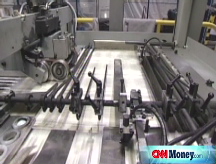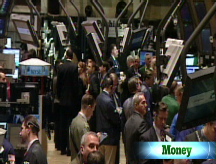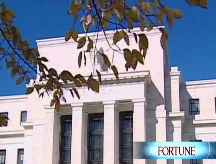A 5-year low
U.S. stocks are clobbered for the 2nd straight day, with Dow losing 500 points. Investor gloom persists.
 |
| Since hitting a peak about a year ago, the Dow has fallen to a 5-year low. |

NEW YORK (CNNMoney.com) -- Wall Street's drubbing continued Tuesday, with a 500-point loss bringing the Dow's two-day slump to nearly 900 points, as the Federal Reserve's plan to loosen credit markets failed to temper investor pessimism.
Fed Chairman Ben Bernanke's dour economic outlook in an afternoon speech added to the day's weakness. And a report showed consumer borrowing in August fell for the first time since January 1998.
The Dow Jones industrial average (INDU) lost 508 points or 5.1%, closing at the lowest point since Sept. 30, 2003.
The Standard & Poor's 500 (SPX) index fell 5.7% and closed below 1,000 for the first time since Aug. 27, 2003. The Nasdaq composite (COMP) lost 5.8% and ended at its lowest point since Aug. 18, 2003.
"There is this feeling that no matter what is done, it won't be enough, " said Darin Pope, chief investment officer at United Advisors of Secaucus, N.J.
Credit markets remained tight Tuesday, but showed some improvement from the previous day. Treasury prices inched lower, with the yields modestly higher. The dollar slumped versus other major currencies. Oil and gold prices gained.
Stocks plunged nearly 370 points Monday, with the Dow to losing as much as 800 points during the session, as the $700 billion bank bailout plan and European government's attempts to prop up faltering banks failed to soothe investors.
Stocks initially rose Tuesday on the Fed's credit plan, but turned lower by midmorning.
"Nearly every day there is another announcement where something is going to be done to prop up the markets," Pope said. "Stocks might see an initial pop, but then the skepticism kicks in."
Bernanke's remarks exacerbated the stock selling. He said the economic outlook has worsened and the financial crisis will hurt the economy well into next year. He also implied that more interest-rate cuts are on the way. (Full story).
The minutes from the last Fed policy meeting were released shortly after Bernanke's speech. The minutes showed the bankers were equally worried about growth and inflation at the Sept. 16 meeting, in which they opted to hold interest rates steady. The meeting had occurred one day after Lehman Brothers filed the biggest bankruptcy in history. (Full story)
After the close, aluminum makers Alcoa (AA, Fortune 500) reported weaker quarterly sales and earnings that missed estimates due to a weakening in aluminum prices and demand. The Dow component also suspended its dividend. Alcoa stock fell 6% in extended-hours trading.
Fed plan: The Federal Reserve said Tuesday it will buy commercial paper, short-term debt that companies use to finance daily operations, from individual companies. Panicky investors have been less willing to buy this kind of debt lately, making it hard for companies to get the money they need to operate.
The Fed move is aimed at creating a market for this kind of debt, ultimately loosening up the frozen credit markets. (Full story)
Businesses depend on the credit markets to function on a daily basis, and the absence of ready capital has hurt consumers and the broader financial system.
"It's another step in the right direction, but it's hard to get too excited about this because nothing yet has worked," said Bill Stone, chief investment strategist at PNC Financial Services Group.
"Eventually, if they [the government] stack up enough things, something will work," he said.
The government has taken a number of dramatic steps of late to try to get the markets functioning properly again amid the housing collapse and subsequent credit crunch.
On Monday, the Fed made an additional $300 billion available to banks in return for a range of damaged assets, on top of another $300 billion already available. The Fed could expand that to $900 billion total by the end of the year.
And on Friday, President Bush signed into law the $700 billion bank bailout, which involves the Treasury buying bad debt directly from banks in order to get them to start lending to each other again.
Stone said that it's positive that the Fed and the Treasury are taking aggressive and creative approaches to handling the current crisis. However, people are exhausted after all that's happened and they are less willing to cheer initiatives that won't kick in for some time.
Company news: After the close Monday, Bank of America (BAC, Fortune 500) reported a steep drop in profit that was short of estimates and cut its dividend. The bank also said it will raise $10 billion through a stock sale and that the company will need to set aside money for bad loans through the coming year. Shares fell over 26% Tuesday. (Full story)
Also late Monday, Wells Fargo (WFC, Fortune 500) and Citigroup (C, Fortune 500) both agreed to a legal standstill in their battle for Wachovia (WB, Fortune 500). (Full story)
AIG (AIG, Fortune 500) was in the spotlight Tuesday, in the second of several House hearings into what led to the current crisis. The government had to bail out the insurance giant with an $85 billion credit line last month to keep it from imploding. (Full story)
On Monday, the House Oversight Committee questioned Richard Fuld, chief executive of Lehman Brothers, which went bankrupt last month.
A variety of financial stocks fell Tuesday, including American Express (AXP, Fortune 500), Citigroup (C, Fortune 500), JPMorgan Chase (JPM, Fortune 500), Goldman Sachs (GS, Fortune 500), Merrill Lynch (MER, Fortune 500) and Morgan Stanley (MS, Fortune 500).
Morgan Stanley shares had fallen as much as 40% during the session on rumors that Japanese bank Mitsubishi UFJ was going to back out of its deal to buy a stake in the company. However, Morgan denied the rumor. (Full story).
But the declines were broad, with all 30 Dow components sliding. Besides the financials, other big losers included Walt Disney (DIS, Fortune 500), GM (GM, Fortune 500), Pfizer (PFE, Fortune 500), Home Depot (HD, Fortune 500) and Wal-Mart Stores (WMT, Fortune 500).
A variety of transportation stocks slid, with airlines, truckers and railroads falling. The Dow Jones Transportation (DJTA) average lost nearly 5%.
Market breadth was negative. On the New York Stock Exchange, losers beat winners seven to one on volume of 1.73 billion shares. On the Nasdaq, decliners topped advancers by over four to one as 2.9 billion shares changed hands.
Global markets: Markets overseas were mixed Tuesday, a day after taking a drubbing everywhere.
Australian markets rallied after the government cut short-term interest rates by a full percentage point, surprising investors. Asian markets ended lower.
European markets were mixed. Russian markets opened late, but managed gains after having been shut down Monday following a steep selloff. (Full story)
(Europe: The new Wall Street?)
Credit markets: Measures of bank nervousness remained at elevated levels Tuesday, but showed some improvement.
The difference between the 3-month Libor and the Overnight Index Swaps fell to 2.93% from a record high of 2.97% earlier in the day. The Libor-OIS spread measures how much cash is available for lending between banks and is used by banks to determine rates. The bigger the spread, the less cash is available.
But 3-month Libor, the rate banks charge each other to borrow for three months, rose to 4.32% from 4.29% Monday.
The TED spread, which is the difference between 3-month Libor and what the Treasury pays for a 3-month loan, fell to 3.56% after hitting an all-time high of 3.95% Monday.
The wider the spread, the more reluctant banks are to lend to each other, rather than from the federal government. When markets are fairly calm, banks charge each other premiums that are not much higher than the U.S. government's.
The yield on the 3-month Treasury bill, seen as the safest place to put money in the short term, rose to 0.69% from 0.44% late Monday, with investors looking for a slightly better return on their money. Last month, the 3-month bill skidded to a 68-year low around 0% as panicked investors fled stocks.
Treasury prices dipped, propelling the yields. The benchmark 10-year note fell 6/32, lifting the corresponding yield to 3.47% from 3.45% Monday. Treasury prices and yields move in opposite directions.
Oil and gold: U.S. light crude oil for November delivery settled up $2.25 to $90.06 a barrel on the New York Mercantile Exchange, after ending the previous session at an eight-month low.
COMEX gold for December delivery rallied $15.80 to settle at $882 an ounce.
Other markets: In currency trading, the dollar slipped against the euro after hitting a 14-month high against the European currency on Monday. The dollar also slipped against the yen, giving up earlier gains. (Full story)
The price of gas decreased for the 20th consecutive day, according to a survey of credit card activity.
Worried about your retirement? Tell us your story ![]()




